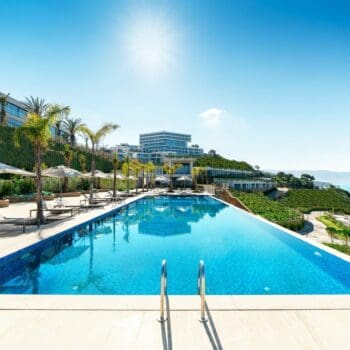 Whether you are looking to update an old hotel or are interested in adding some upgrades to an already modern structure, focusing on making your hotel more sustainable can go a long way toward appealing to today’s more eco-conscious generation of travelers.
Whether you are looking to update an old hotel or are interested in adding some upgrades to an already modern structure, focusing on making your hotel more sustainable can go a long way toward appealing to today’s more eco-conscious generation of travelers.
With climate change awareness increasing, people are increasingly adopting more sustainable practices, and their travel behaviors are no exception. Research shows that sustainable accommodations matter to 78% of travelers today.
Furthermore, not only are consumers interested in being more eco-conscious when they travel, but governments are also starting to enforce more sustainability regulations on businesses to protect the environment. As such, going green with your hotel renovations now can help you get a head start so you can stay compliant as new regulations are enforced.
The benefits of a green hotel
Renovations can be a big undertaking, so, understandably, there would need to be an incentive to do so, especially if you are a smaller hotel with fewer resources and funds. Whether your hotel is large or small, you can and will find that there are numerous benefits to going green.
Some of the many benefits of green renovations include:
- Improved energy efficiency, which lowers costs;
- Increasing brand awareness;
- Improving customer loyalty;
- Tax incentives;
- Better corporate social responsibility;
- Giving your hotel a competitive advantage.
Going green is no longer just a trend or a phase. People are very serious about being more eco-conscious today, and as such, they are more likely to support businesses that are making an effort to be more sustainable.
Eco-friendly hotel renovation strategies to boost sustainability and profit
There are many ways to incorporate more sustainable systems and designs into a hotel renovation. From landscaping to waste management, these are some of the best green strategies to make your hotel more sustainable and appealing to eco-conscious guests.
1. Eco-friendly landscaping
One of the first things guests see when they pull up to a hotel is the landscaping, as such, hotels often go out of their way to have lush, attractive greenery. Unfortunately, a lot of hotel landscaping is not very eco-friendly. Just because it looks lush and natural, doesn’t mean it’s good for the environment.
However, it is possible to still have beautiful landscaping while also being mindful of the environment. Some eco-friendly landscaping strategies can include:
- Using plants that require less water;
- Opting for landscaping that helps with drainage;
- Choosing trees to provide shade to help reduce cooling costs;
- Using some of the landscaping for growing crops that can be used for food in the hotel;
- Installing permeable paving that allows water to still get through to the ground and plants;
- Using locally sourced or repurposed materials instead of importing;
- Opting for native plants only as they are better for the local wildlife and ecosystem.
With these changes, you’ll find that you’ll draw in tourists who value sustainability, but you may also save money on your water bill.
2. Sustainable building materials
If your renovations include building new structures, make sure you opt for using green construction materials as much as possible. Instead of buying everything new or importing, you can choose to source from local vendors and even use recycled materials. Mass timber made from prefabricated wood components is also more sustainable than using materials like steel or concrete. Bamboo is also a sustainable alternative as it’s easy to find and source and produces very little waste.
3. Water conservation
If there is one thing that hotels use a lot of, it’s water. As such, finding ways to save water is perhaps one of the best things you can do to help reduce your hotel’s impact on the environment. This can be done by:
- Installing low-flow plumbing fixtures;
- Using tanks or systems that allow you to recycle greywater or rainwater;
- Using insulated pipes to reduce heat loss when using hot water;
- Using smart irrigation sensors that stop running when precipitation is detected.
This, in combination with eco-friendly landscaping, will save your bottom-line and the Earth at the same time.
4. Energy efficient lighting
Next to water, energy usage is also another major problem in the hotel industry. The more energy you use, the more fossil fuels release carbon emissions into the atmosphere. So updating to more energy-efficient lighting can help.
Simply upgrading all of your lights to LEDs can make a huge difference, but you should also look for ways to potentially reduce how many lights you use in spaces where it’s unnecessary. You can also use motion-detecting sensors for lights in some areas where the lights don’t need to be on 24/7.
Ensuring a successful hotel renovation
One of the downsides of performing renovations at a hotel is the impact it will have temporarily on your business. You don’t want to have to completely shut down, but you also don’t want to disturb guests with noise from the renovations either. Iin some cases, it might make more sense to close down for a short period and simply get the renovations over with quickly as opposed to doing a partial closure and staggering renovations over a longer period of time.
So when deciding to undertake a renovation project, your first step should be planning whether you want to do a full or partial closure. If any sort of closure is necessary, it’s best to schedule the project for your off-season or times when business has been historically slower, which is perhaps during the colder months, depending on the location.
When you are planning to reopen after a renovation, there are also some things you can do to boost profits in case you lost some business while you were shut down. Depending on how big the changes are that you made, it might be a good idea to run a new marketing campaign to spread awareness that you are open again and made some exciting new changes. You can also work with local influencers to spread the word to the local community about the changes you’ve made and that you are back in business.
In summary
A renovation might be a big undertaking, but making sustainable upgrades is well worth it in the long run. It showcases your commitment to both luxury and eco-consciousness, it will help you bring in more traffic from consumers who are more interested in sustainable travel, and it will ensure you remain compliant with standards as the government starts enforcing more sustainability regulations on businesses moving forward.



















